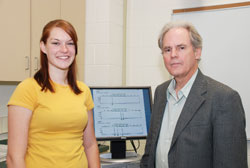- About Ramapo
- Academics
- Admissions & Aid
- Student Life
- Athletics
- Alumni
- Arts & Community
- Quick Links
- Apply
- Visit
- Give
Ramapo Undergraduates Part of Research Team Publishing Two Papers
(PDF) (DOC) (JPG)October 15, 2009

Genetic analysis of five moss species to appear in The Bryologist
(MAHWAH, NJ) – Four Ramapo College students were part of a research team led by Professor Eric Karlin that has recently completed two research projects on peatmosses (Sphagnum). The outcomes of the research will be published in the premier North American scientific journal dedicated to the study of mosses and lichens.
The two projects employed microsatellite DNA technology to explore aspects of the evolution and taxonomy of five peatmoss species. The researchers discovered that each of the species studied appeared to have a history of hybridization followed by a doubling of all of the chromosomes present. Such organisms, called allopolyploids, have double the number of chromosomes of a typical peatmoss. Unlike most hybrids, allopolyploids are fertile and represent the rapid evolution of a new species (a process called reticulate evolution). Although allopolyploidy has played a significant role in the evolution of many flowering plants, it has been detected in only a few moss species.
The two papers will appear in 2010 in The Bryologist: “Allopolyploidy in Sphagnum mendocinum and S. papillosum (Sphagnaceae)” and “Microsatellite analysis of Sphagnum centrale, S. henryense, and S. palustre (Sphagnaceae). Seniors Graeme Gardner, of Point Pleasant Beach, and Katie Lukshis, of East Brunswick, are among the co-authors of the first paper; Melissa Giusti ’09, of Old Bridge, and Rebecca Lake ’09, of Budd Lake, are among the co-authors of the second paper.
“It’s wonderful to see undergraduates participate in research resulting in a peer reviewed publication,” said Karlin, a professor of Plant Ecology. ” It gives them a real taste of the world of science, an appreciation of the value of teamwork, and strong encouragement to pursue a robust career in the sciences.”
The research was done in collaboration with Sandra Boles and Professor Jonathan Shaw, both at Duke University. The genetic lab work was performed at the Duke Bryology Laboratory in the spring of 2008; subsequent analysis of the microsatellite DNA data occurred at Ramapo College in the summer and fall of 2008. The project was supported in part by a faculty/student grant from Ramapo College and by a National Science Foundation grant to Jonathan Shaw (DEB 0515749).
Professor Karlin is currently developing grant proposals that will allow for a continuation and expansion of his genetic study of peatmosses. The proposed research is structured so that undergraduates may participate at several levels and it will provide the opportunity for future publications with students as co-authors.
###
About Ramapo College
Ramapo College of New Jersey is the state’s premier public liberal arts college and is committed to academic excellence through interdisciplinary and experiential learning, and international and intercultural understanding. The comprehensive college is situated among the beautiful Ramapo Mountains, is within commuting distance to New York City, was named one of the 50 Most Beautiful College Campuses in America by CondeNast Traveler, and boasts the best on-campus housing in New Jersey per Niche.com. Established in 1969, Ramapo College offers bachelor’s degrees in the arts, business, data science, humanities, social sciences and the sciences, as well as in professional studies, which include business, education, nursing and social work. In addition, the College offers courses leading to teacher certification at the elementary and secondary levels, and offers graduate programs leading to master’s degrees in Accounting, Applied Mathematics, Business Administration, Contemporary Instructional Design, Computer Science, Creative Music Technology, Data Science, Educational Leadership, Nursing, Social Work and Special Education, as well as a Doctor of Nursing Practice.
Press Release Archives
| 2025 | 2024 | 2023 | 2022 | 2021 | 2020 | 2019 | 2018 | 2017 | 2016 | 2015 | 2014 | 2013 | 2012 | 2011 | 2010 | 2009 | 2008 | 2007 | 2006 | 2005 | 2004 | 2003 | 2002 | 2001 | 2000 | 1999 |Copyright ©2025 Ramapo College Of New Jersey. Statements And Policies. Contact Webmaster.

Follow Ramapo